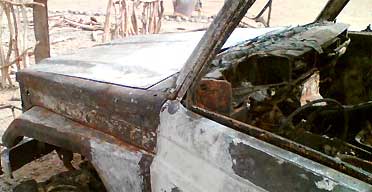All five of the British embassy hostages abducted in a remote region of Ethiopia almost two weeks ago have been freed today.
The foreign secretary, Margaret Beckett, announced that the group - all British officials or relatives of officials - had been released into the care of the Eritrean government. They were understood to be in good health.
The three British hostages were named today as Peter Rudge, first secretary at the British embassy in Addis Ababa, Jonathan Ireland, who works in administration at the embassy, and Malcolm Smart, an official from the Department for International Development (DfID).
Laure Beaufils - a French national also employed by DfID in the capital, Addis Abbaba - and Rosanna Moore, the wife of the head of the British Council in Ethiopia, who holds dual British and Italian nationality, were also released.
The media had agreed to government requests not to reveal their identities until their release had been secured.
"I am delighted to be able to tell you that all five were released early today," Mrs Beckett told a press conference at the Foreign Office. "Broadly, they are all in good health".
She paid tribute to the British embassy officials who had "worked tirelessly" to secure the hostages' release.
Mrs Beckett said their families had been "very relieved to hear the news" and were "looking forward to being reunited" with their relatives. A statement from the five is expected later today.
However, she added that the government was still concerned about the safety of the Ethiopians who had been travelling with the group and were also abducted.
It is believed some were employed as cooks, drivers and guides.
Prime minister Tony Blair's official spokesman welcomed the release of the hostages, thanking the governments of Ethiopia and Eritrea for their help in securing their release.
The five Britons went missing on Thursday March 1 during a visit to geographical sites in the remote Afar region, which straddles the border of Ethiopia and Eritrea.
The two women and three men were kidnapped after a gang of up to 50 uniformed armed men overpowered their guards, setting fire to their cars and the guesthouse at which they were staying.
Witnesses said they saw the group being marched towards the border with Eritrea, 12 miles from the kidnap scene.
Two vehicles belonging to the group were later found abandoned in the north-eastern village of Hamedali. They were riddled with bullets and still contained luggage and mobile phones.
The Ethiopian prime minister, Meles Zenawi, said yesterday that the hostages were "safe and well" and officials had a "good idea" of where they were being held.
Suspicion for the kidnapping initially fell on Afar separatists, who kidnapped a group of Italian tourists in the area during the mid-90s. However, eyewitness accounts pointed to the Eritrean army.
Ethiopia and Eritrea fought a brutal border war between 1998 and 2000, and the dispute over the frontier has never been resolved.
There are still tens of thousands of troops on either side of a UN-patrolled buffer zone, and visitors to Afar are warned to travel in convoy with armed guards because of rebels and bandits.
The countries, which remain bitter enemies, regularly accuse each other of trying to spread instability.
The village of Hamedali, where the vehicles were found, is a staging post for tourists willing to withstand searing temperatures to explore the geological formations of the Danakil Depression, including the area's famous salt lakes.
